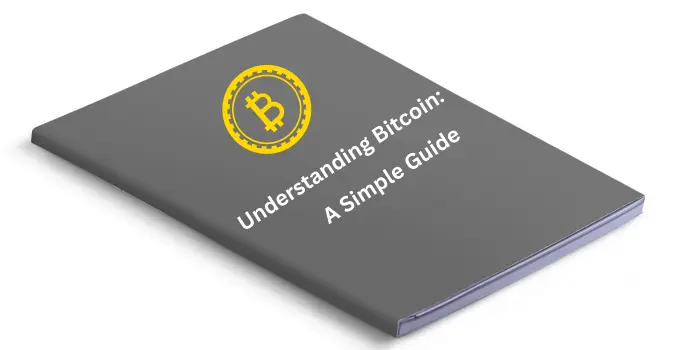
Navigating the maze of digital money: Are Bitcoin and cryptocurrency the same, or is there more than meets the eye?
This article uncovers the unique quirks that make Bitcoin ride on top of the waves in the vast ocean of cryptocurrencies.
So let’s take a journey through Bitcoin's standout traits, from being a shield against inflation to offering safe transactions, as we decode why Bitcoin is often the star of the crypto show.
I also address the wisdom shared in the enlightening chat between Robert Breedlove and Lex Fridman, when they discuss how Bitcoin stacks up against other cryptocurrencies.
Bitcoin is the pioneer and most popular type of cryptocurrency, while cryptocurrency is the general term for all virtual currencies. Think of Bitcoin as a digital currency that works independently without banks or governments, has a limited supply, and operates through complex mathematical puzzles allowing secure transactions through a public ledger. However, remember that there are many other cryptocurrencies with different features and uses, expanding the possibilities of what it means to be a digital currency as well.

Let's dive into the world of Bitcoin, the first-ever digital money that doesn't need banks, governments, or any central authority to function. It's kind of like cash for the internet!
How does it work? Well, think of Bitcoin as being on a giant ledger, but instead of being stored in a single location like a bank, it's shared across many computers worldwide. These computers are known as nodes. They constantly talk to each other to confirm who owns what - no central boss is needed!
Imagine you're at a coffee shop with friends, and you want to split the bill. You could give your share to one friend, they take everyone's cash and pay the bill. Now, replace that friend with Bitcoin - it works similarly, but online and across borders.
When someone sends some Bitcoin, it gets announced to all nodes. Certain nodes called miners then bundle these announcements into groups known as blocks. Think of this as taking a snapshot of all transactions at a given time. These blocks are added to a long chain of previous blocks - hence the name, blockchain! This is like a history book of all Bitcoin transactions.
Where do we keep these bitcoins? Just as we keep physical money in wallets, bitcoins are stored in digital wallets (Well, actually it’s your private key or keys that are stored in your wallet). It's a bit like an online bank account, but only you have the key.
This Bitcoin business all started back in 2009, thanks to an unknown person (or group) called Satoshi Nakamoto. So bitcoin is a type of digital money called cryptocurrency, and it's all about keeping transactions safe and secure using fancy math (cryptography) and a record-keeping system (blockchain).
What's neat about Bitcoin is that it's decentralized. This means no one person, bank, or government controls it. Instead, it's all about people trading directly with each other. It's like a giant, global swap meet where everyone's welcome to join.
Bitcoin's goal was to be a new type of money that anyone, anywhere, could use to buy things. However, its price jumps around a lot, which can make people hesitant to use it for everyday purchases. Despite that, it's still a popular choice for people looking for an alternative to traditional money.
Bitcoin (BTC for short) has become famous as a new form of money that no one person or group controls. Since it hit the scene, lots of other cryptocurrencies have popped up, hoping to follow in its footsteps.
So, how do we get bitcoins? Well, those 'miners' we mentioned earlier get rewarded with bitcoins for their work in grouping transactions into blocks. This reward is halved periodically, which helps keep a lid on the total number that can ever exist. Each bitcoin can be split into tiny pieces called satoshis - think of it like breaking a dollar into cents.
There you have it - Bitcoin in a nutshell! It's a new, digital form of money that works 24/7, lets people send money directly to each other, and doesn't need banks or governments to operate. A truly exciting prospect in our increasingly digital world!

Cryptocurrency is like virtual money, but instead of being controlled by a government or bank, it's managed by its users over the internet. Picture it as a digital form of money that you can use online.
You can use cryptocurrency (often called 'crypto') to buy stuff, but many people treat it more like an investment, similar to stocks or gold. It's worth mentioning though, investing in crypto can be risky and you really need to do your homework if you hope to understand it, and never invest or trade more than you can afford to lose.
So as mentioned above, bitcoin was the first crypto and was introduced in a paper in 2008 by someone (or some people) calling themselves Satoshi Nakamoto. The idea was to create a new kind of electronic money system that relies on math proofs, not trust.
These proofs come from transactions that are checked and recorded on the blockchain. Think of the blockchain as a big, secure, online business journal that keeps track of every transaction and prevents people from cheating (like spending the same money twice).
Cryptocurrencies can also be called 'coins' or 'tokens', depending on how they're used. Some are used like money to buy and sell things, some are saved as an investment, and others are used for specific apps, like video games or financial software.
Crypto relies on a type of math called cryptography to keep transactions secure. It exists as digital information and the keys that secure it are kept in digital wallets. This fancy math ensures that the data is safe when it's stored and sent to someone else.
Cryptocurrencies and blockchain technology are still new and growing, and in the future, we might see them used more broadly, maybe even for things like bonds, stocks, and other types of investments.
So that's a quick rundown of cryptocurrency. It's an exciting new frontier in finance and technology that's still being explored and developed.

Cryptocurrency is like a giant umbrella, and Bitcoin is like a particular spot under that umbrella. In other words, Bitcoin is a type of cryptocurrency, but not all cryptocurrencies are Bitcoin.
Bitcoin, often referred to as BTC, is the most famous kind of cryptocurrency and started all the buzz. But remember, Bitcoin is just one of many types of cryptocurrencies available.
When using Bitcoin, you have a public address where people can send you money and a private key that lets you spend it. Bitcoin transactions are checked and confirmed by users (called miners) who solve complex math problems.
However, not all cryptocurrencies work in the same way as Bitcoin. Some cryptocurrencies are controlled or created by specific groups or companies, and they may use different methods for checking and confirming transactions. For example, Binance Coin (BNB) is managed by the Binance company and operates a bit differently than Bitcoin.
Cryptocurrencies, including Bitcoin, are used in different ways and cryptocurrency in general can include a whole range of digital money with different uses. Some are used for things like decentralized finance, offsetting carbon emissions, or playing games online.
While Bitcoin was created to focus on letting people send money, other cryptocurrencies like Ethereum let users create and use smart contracts and applications. Some like Chainlink (LINK) or Binance Coin (BNB) are used for specific online systems and can't be used outside of them, unlike Bitcoin.
Bitcoin has a maximum limit of 21 million coins, ensured by the hard cap put in its source code by Nakamoto. This makes it similar to gold, as there is only a finite amount available. The number of new Bitcoins created gets halved periodically. Other cryptocurrencies might not have a fixed limit and can change based on different factors, making them more like traditional money.
Bitcoin is also the most valuable cryptocurrency, as far as market cap goes. So, since Bitcoin is the major player, changes in smaller cryptocurrencies might not have a big impact on the total value of the crypto market.
Robert Breedlove, a fairly well-known entrepreneur and philosopher in the Bitcoin realm, and Lex Fridman, who according to (Wikipedia) “is a Russian-American computer scientist, podcaster, and artificial intelligence researcher.”, had a discussion on Fridman's podcast regarding the philosophy of Bitcoin. I just watched the “Lex Clips” video “Bitcoin vs other cryptocurrencies” on YouTube or a snippet of the aforementioned podcast if you will.
So after watching it: What I think Mr. Breedlove is saying, is that because of the winner-take-all mentality concerning money and the fact that Bitcoin has been at the head of the table in the crypto community since its inception, along with other traits, like its divisibility & scarcity, that Bitcoin is the Gold standard when it comes to money. Probably even more so than fiat currencies and gold itself.
And that Bitcoin is following the same road that its physical counterpart, Gold traveled, only virtually. For instance; Gold’s superiority over other commodities is closely matched by Bitcoin’s superiority over other cryptocurrencies. Bitcoin has Higher liquidity compared to other cryptos and makes a stronger case for being a hedge against inflation as well. It is also finite, and then there is the network effect too… which simply means it’s more valuable than other cryptos because there are more people that want it, as compared to the amount of people that want the other cryptos. The finalization of the transactions on its blockchain is more secure as well.
Now here is my take on it: I think Robert makes a lot of good points and I agree with his overall premise. I too think once everything is said & done there will be a lone crypto king that will outshine all the rest, whose name will probably be Bitcoin. But even though it’s highly likely that Bitcoin will come out on top, because of its first-mover advantage, along with a lot of other things, such as its being finite (which makes a good argument for it to be used as a store of value), its liquidity, and as a potential hedge against inflation. I still think we should keep our eye on Ethereum… since it continues to be the leading player in the cryptocurrency space when it comes to smart contracts and DeFi.
Although, with that being said, Ethereum will probably still end up being a knight and Bitcoin the king in this Crypto Game of Thrones. But regardless of what happens in this territorial fight, Ethereum will likely last the test of time… even as a lot, if not all of the other altcoins go the way of the Dodo.
Now the video goes into more depth than what I’ve touched on. So here is the clip for anyone who wants to view their discussion in its entirety.
1. Can you turn Bitcoin into cash?
Curious if your Bitcoin can become cash? Well, it absolutely can! You can sell Bitcoin for cash on exchanges like Coinbase, direct trade with others on LocalBitcoins, or even use a Bitcoin ATM to withdraw money. But remember, this process can involve fees, and taxes, and might take a little time before you see the cash in your hands. So, consider all these factors when you're turning your digital gold into real-world money.
2. What is Blockchain?
Think of it like a public, unchangeable diary where everyone can note down and track their trades, be it money or assets, all done safely without a middleman. It's the backbone of things like cryptocurrencies and digital contracts. Because of this, everything is out in the open, making dealings fairer and potentially cheaper. This tech is shaking up industries across the board!
Bitcoin, the first and most popular cryptocurrency, stands apart in the digital money realm, working independently without any central authority. It shines with its unique traits such as ease of trade, protection against inflation, secure transactions, limited supply (much like gold), and a strong user base. Bitcoin's magic lies in its peer-to-peer transactions, bolstered by sophisticated math (cryptography) and blockchain technology (a sort of digital diary). So, while Bitcoin is part of the wider family of cryptocurrencies, it's the high-achieving sibling that everyone recognizes. The term 'cryptocurrency' is a broad term that encompasses Bitcoin along with many other types of digital currencies, much like 'fruit' can refer to apples, oranges, bananas, and so on. As we look to the future, we anticipate the cryptocurrency world will keep evolving and finding new uses, with Bitcoin firmly maintaining its spot as a valuable and widely accepted forerunner, no doubt. In the grand scheme of digital currencies, Bitcoin may just be one member, but it's definitely an important one.